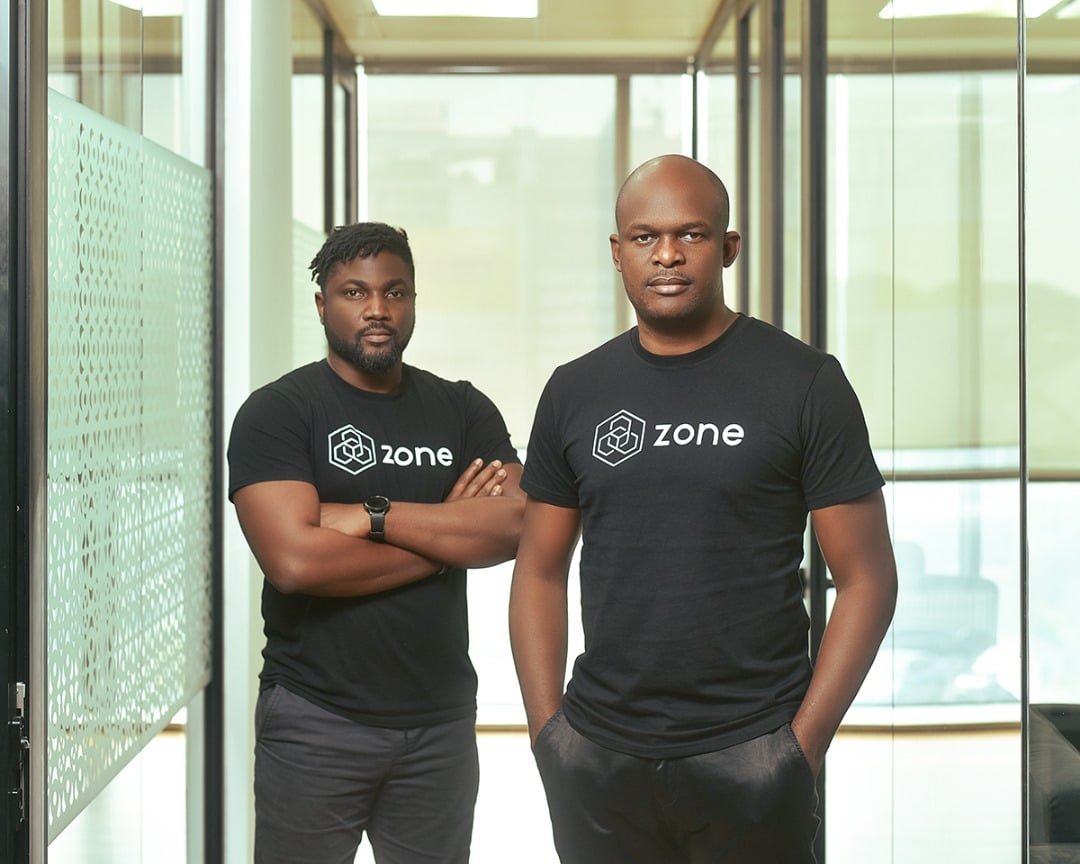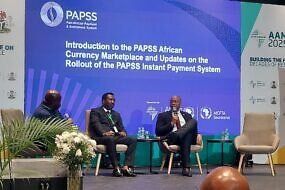Zone, a Nigerian blockchain payment company, is building a financial network where crypto projects and banks can operate together under government rules.
Imagine if the Central Bank of Nigeria (CBN) had control over Ethereum or Solana. Developers would need to follow CBN’s rules when launching tokens or creating DeFi products. Gas fees would be paid in naira instead of ETH, and the government could see all blockchain activities. That’s the kind of regulated future Zone is working toward — a blockchain where compliance is built into the system.
Zone Already Connects Banks Without Third Parties
Right now, Zone has already built a regulated blockchain network where Nigerian banks can make payments directly to each other. Normally, banks rely on a payment switch like Interswitch or eTranzact to process transactions. But with Zone, all banks exist within the same blockchain. This means they can track transactions in real time and solve payment issues faster.
 L-R: Wale Onawunmi (Co-Founder & CTO Zone) Obi Emetarom ( Co-Founder & CEO Zone)
L-R: Wale Onawunmi (Co-Founder & CTO Zone) Obi Emetarom ( Co-Founder & CEO Zone)
Zone’s CEO, Obi Emetarom, explained that the current system causes delays. If there’s a problem, the switch has to speak to both banks to fix it. On Zone, banks can see everything at once, making the process much easier.
Emetarom shared this bigger idea in a white paper. He believes that blockchain can transform how the world handles money. His plan includes building a global financial network where blockchain is regulated, fast, and secure — all at the same time.
He said, “Combining regulation with blockchain is the future of financial services.” This means regulators won’t fight new tech. Instead, they will become part of it.
Why Regulated Blockchain Matters
Zone wants to solve problems faced by both traditional finance (TradFi) and decentralised finance (DeFi). TradFi is often slow, expensive, and full of middlemen. DeFi is faster and more open, but it lacks rules, which scares away big investors.
Zone plans to mix the best of both worlds. With regulation built into the blockchain, banks and startups can safely build apps, tokens, and services. The system will be fast and open like DeFi, but also safe and legal like TradFi.
In this system, regulators will help write the rules in code. These rules will automatically check for fraud, money laundering, and other risks.
How Zone’s Regulated Blockchain Will Work
Zone’s regulated blockchain will be like Ethereum — but with government oversight. Only approved companies and regulators can run validator nodes, build apps, or create tokens. Every new app or token will go through a screening process to make sure it follows the rules.
Regulators won’t just watch from the outside. They’ll be part of the system, monitoring everything as it happens.
Even though users will still control their wallets and assets, the system will use stable digital tokens linked to real money, like the naira or CBDCs. This means people get the freedom of crypto with the safety of regular banks.
Zone also wants to fix the problems with lending. Right now, traditional lenders can misuse funds, and DeFi loans can be unsafe because the code might be hard to understand or contain hidden risks.
With Zone’s system, smart contracts will run lending services. These contracts will follow strict rules that both humans and automated tools have checked. No one can change the rules once deployed. If they need updates, they must go through the approval process again.
This makes lending safer and more transparent. Users won’t have to worry about shady developers or banks misusing their money.
Will Zone’s Plan Work?
Zone’s idea sounds promising. It could help regulators like Nigeria’s SEC easily enforce rules. For example, token creators would just need to launch on Zone’s blockchain, and they’d automatically meet compliance requirements.
However, similar projects like Hyperledger and R3 Corda failed to go mainstream. They stayed in test stages or were only used by a few companies.
One major challenge was a lack of compatibility with other systems. But Zone now supports Solidity — Ethereum’s programming language. This means Ethereum apps can run on Zone, helping solve the compatibility problem.
Still, politics may remain a major obstacle. African regulators have admitted that tech isn’t the issue behind slow cross-border payments — politics is.
Zone’s vision depends on factors beyond technology. But if it can overcome political challenges, it may reshape how the world builds and runs financial systems.
- Luno Launches Crypto Staking in Nigeria
- PAPSS Launches African Currency Marketplace
- Seychelles Still Dominates Blockchain Funding in Africa
- Binance Exec Quits Months After Nigerian Ordeal
- Zhao Suggests Dark Pool DEX to Curb Crypto Manipulation
- Blockchain.com to Expand into Africa, Open Office in Nigeria













One reply on “Zone Proposes Regulated Blockchain for Crypto and Banks”
[…] and crypto businesses can work safely under government rules. Banks now send money directly through Zone’s blockchain, making payments faster and solving problems quicker. CEO Obi Emetarom says this system mixes the […]